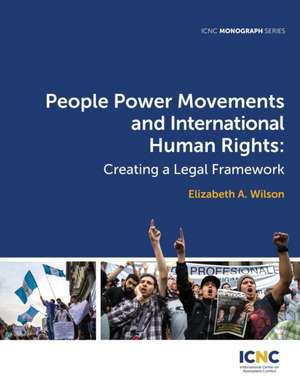People Power Movements and International Human Rights
Autor Elizabeth A. Wilsonen Limba Engleză Paperback – 11 iul 2017
Preț: 137.99 lei
Nou
Puncte Express: 207
Preț estimativ în valută:
26.41€ • 27.24$ • 22.35£
26.41€ • 27.24$ • 22.35£
Carte disponibilă
Livrare economică 11-25 februarie
Preluare comenzi: 021 569.72.76
Specificații
ISBN-13: 9781943271108
ISBN-10: 1943271100
Pagini: 166
Dimensiuni: 216 x 280 x 11 mm
Greutate: 0.53 kg
Editura: International Center on Nonviolent Conflict
ISBN-10: 1943271100
Pagini: 166
Dimensiuni: 216 x 280 x 11 mm
Greutate: 0.53 kg
Editura: International Center on Nonviolent Conflict
